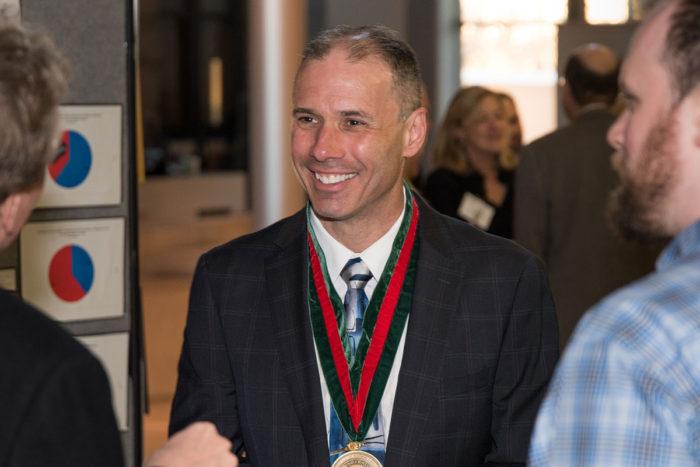Racette named Robert Allan Finke Professor of Neurology
Physician-scientist recognized for work on manganese neurotoxicity
 Mark Beaven
Mark BeavenBrad A. Racette, MD, has been named the inaugural Robert Allan Finke Professor of Neurology.
Brad A. Racette, MD, a noted expert in movement disorders, has been named the inaugural Robert Allan Finke Professor of Neurology at Washington University School of Medicine in St. Louis.
“Dr. Racette is an internationally recognized leader in the study of heavy metal exposures and neurological disease,” said Chancellor Mark S. Wrighton. “The generosity of Robert Allan Finke allows us to continue supporting Dr. Racette’s groundbreaking work, which is truly making a difference in improving human health.”
Racette – who has conducted studies in the United States, Europe and South Africa – investigates how the heavy metal manganese leads to neurological damage. He focuses on miners and welders who encounter manganese as part of their jobs, as well as people who live near sites contaminated with the metal.
“This professorship recognizes the accomplishments of one of our most outstanding scientists,” said David H. Perlmutter, MD, executive vice chancellor for medical affairs and dean of the School of Medicine. “Brad Racette’s work has been instrumental in elucidating the dangers to human health of environmental and occupational manganese exposure.”
A recent study by Racette and colleagues showed that welders exposed to manganese at estimated levels well below the federal occupational safety standards develop a pattern of neurological signs and symptoms similar to Parkinson’s disease, such as muscle stiffness, slow movements and tremor.
Using PET and MRI scans, Racette has shown that welders exposed to manganese-containing fumes exhibit a pattern of changes to their brains similar to that shown by people with Parkinson’s disease. He found that welders have low numbers of cells containing the biomolecule dopamine – responsible for transmitting signals from one nerve cell to another – in the same brain structures affected in Parkinson’s patients.
“Brad has been at the forefront of research into how manganese damages the nervous system, especially how it may lead to symptoms of Parkinsonism,” said David M. Holtzman, MD, the Andrew B. and Gretchen P. Jones Professor and head of the Department of Neurology.
Further, Racette has shown that some cases of Parkinson’s disease in the general population could be caused by environmental manganese exposures.
“Our data suggest that reducing industrial metal emissions may result in a substantial reduction in the number of new cases,” Racette said.
Racette earned a bachelor’s degree in molecular biology from Princeton University in 1988, followed by a medical degree from Northwestern University. After completing his internship in internal medicine at Northwestern Memorial Hospital, Racette came to St. Louis for a neurology residency and movement disorders fellowship with Joel S. Perlmutter, MD, a professor of neurology at Washington University School of Medicine. Racette joined the faculty in 1998.
The Robert Allen Finke Professorship stems from a generous commitment Finke made to the Department of Neurology before his death in 2015.
The son of the late Edward R. and Mildred L. Finke, Robert Allan Finke graduated in 1968 from University City High School, where he won a National Merit Scholarship to attend Harvard University. After earning a bachelor’s degree there in 1972, Finke returned to St. Louis to attend Washington University School of Law, where he earned a law degree. He spent his career in private practice in the St. Louis area, and served on the advisory board of Washington University Law Quarterly.






